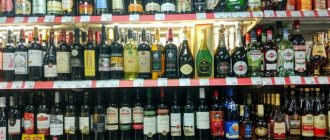Law in the fight against alcoholism
Article 21 of the Russian Civil Code states that adulthood occurs at 18 years of age.
From the moment a person reaches his 18th birthday, he is considered fully capable and responsible for the consequences of his decisions. According to the requirements of Federal Law No. 218 of 2011, employees and management of alcohol retail outlets are obliged (have every right) to demand from customers a document confirming the age of majority when dispensing alcoholic beverages.
At the initiative of the Ministry of Health and the Chief Sanitary Doctor of Russia, Resolution No. 16 was issued, classifying beer as alcoholic beverages in December 2000.
The same Federal Law No. 171-FZ provides for restricting the sale of alcoholic beverages at night in order to improve the health of Russians and increase safety on city streets. A complete ban on the sale of alcohol from 11 pm to 8 am is mandatory in all regions. Local authorities have the right to change the “sober” time of day upward. So, in St. Petersburg, alcoholic drinks are sold from 11 o’clock in the afternoon to 22 o’clock in the evening.
What alcohol cannot be sold to minors in Russia
The State Duma has made a number of additions to the law on state regulation of the production and sale of alcohol-containing products. Russian parliamentarians adopted changes to Article 2, clarifying the categories of regulated alcohol products, in June 2015.
Alcoholic products are food products containing more than 0.5% alcohol and are divided into the following types:
Alcoholic drinks: vodka, cognac, berry and fruit wine, liqueurs, champagnes, beer, cider, mead, poire.
Non-alcoholic beer is not considered alcoholic beverages due to its extremely low alcohol content (less than 0.5%).
According to the legislation, persons under 18 years of age cannot buy anything other than non-alcoholic beer, since vodka contains 38-56% alcohol, cognac - at least 40%, wine - 8.5-16.5%, liqueurs - 15 -22%, wine drink - 1.5-22%, cider and poiret - no more than 6%, mead - 1.5-6%, beer and beer-based drinks - 4-14%.
Drinks are also distinguished by the amount of ethyl alcohol.
- Low alcohol drinks containing less than 15% ethyl alcohol.
- Medium-alcohol drinks with alcohol content in the range of 15-30%.
- Strong alcohol.
The latter includes vodka, cognac, whiskey and all alcohol-containing drinks stronger than 30%.
Requirements and documents for trading beer
It is probably common knowledge that beer cannot be sold to minors, but there may be little awareness of the legal consequences of this illegal act. According to Article 14.16 of the Code of Administrative Offenses, violators face significant sanctions:
How to sell beer legally
- Registration on the website of the Federal Service for Regulation of the Alcohol Market (Rosalkogolregulirovanie).
- Obtaining an identification number (ID), which is subsequently indicated by suppliers in invoices, which is automatically reflected in the EGAIS system.
According to paragraphs. 45 - pp. 48 clause 2 art. 346.43 of the Tax Code of the Russian Federation: Retail trade is a business activity related to the trade of goods (including in cash, as well as using payment cards) on the basis of retail purchase and sale contracts. This type of business activity does not include the sale of excisable goods specified in paragraphs. 6 - clause 10 clause 1 art. 181 Tax Code of the Russian Federation.
According to Art. 181 of the Tax Code of the Russian Federation, excisable goods are recognized, including: 3) alcoholic products (vodka, liquor, cognac, wine, fruit wine, liqueur wine, sparkling wine (champagne), wine drinks, cider, poiret, mead, beer, drinks , made on the basis of beer, other drinks with a volume fraction of ethyl alcohol of more than 0.5 percent, with the exception of food products in accordance with the list established by the Government of the Russian Federation; 4) has become invalid since January 1, 2011. — Federal Law of November 27, 2010 N 306-FZ; 5) tobacco products; 6) excluded. — Federal Law of July 24, 2002 N 110-FZ. 6) passenger cars; 6.1) motorcycles with an engine power exceeding 112.5 kW (150 hp); 7) motor gasoline; diesel fuel; 9) motor oils for diesel and (or) carburetor (injection) engines; 10) straight-run gasoline.
181 of the Tax Code of the Russian Federation, excisable goods are recognized, including: 3) alcoholic products (vodka, liquor, cognac, wine, fruit wine, liqueur wine, sparkling wine (champagne), wine drinks, cider, poiret, mead, beer, drinks , made on the basis of beer, other drinks with a volume fraction of ethyl alcohol of more than 0.5 percent, with the exception of food products in accordance with the list established by the Government of the Russian Federation; 4) has become invalid since January 1, 2011. — Federal Law of November 27, 2010 N 306-FZ; 5) tobacco products; 6) excluded. — Federal Law of July 24, 2002 N 110-FZ. 6) passenger cars; 6.1) motorcycles with an engine power exceeding 112.5 kW (150 hp); 7) motor gasoline; diesel fuel; 9) motor oils for diesel and (or) carburetor (injection) engines; 10) straight-run gasoline.
That is, trade in excisable goods specified in paragraphs. 6 - clause 10 clause 1 art. 181 of the Tax Code of the Russian Federation, is not subject to PSN taxation. Beer (excise goods) and cigarettes (marked goods) are specified in paragraphs. 3 and paragraphs. 5 p. 1 art. 181 Tax Code of the Russian Federation. Consequently, an individual entrepreneur has the right to use PSN in the retail trade of cigarettes and beer.
Such examples are recorded in judicial practice. For example, in 2016 in the city of Sarov, Nizhny Novgorod region, the seller of the PIVTORG bar N.I. Lukashov. fined for selling beer after 22:00 (No. 5-611/2016). The situation was controversial - the buyer put down money and took a bottle of beer from the bar while the seller was getting cups. There was a warning in the hall that drinking alcohol at night was only allowed in the bar area. However, the buyer was drunk.
The state's concern for the health of the nation results in high fines for selling alcohol to minors. In 2021, a company can pay up to 500 thousand rubles for a seller’s mistake, and the seller himself can be held criminally liable. In the article you will learn not only about the amounts of penalties, but also the grounds for their application.
What you will learn about:
However, the police can put pressure on the teenager by recording in his testimony that he himself allegedly reported the sale of alcohol to the police. Video cameras installed near the cash registers and at the entrance to the store can help you understand the situation.
- Regional legislation . In each subject of the Russian Federation, local authorities have the right to establish their own laws that do not contradict the national laws. Accordingly, regions may prohibit the sale of such beer and other tonic drinks, such as energy drinks.
- Store-specific practices . If a seller or store has already been fined for selling alcohol to minors, it is unlikely that he will want to receive such a large fine again. Therefore, the chance of purchasing even non-alcoholic beer in such a store will be minimal. But if the seller is primarily pursuing revenue and has not previously received a fine for selling such products, it is likely that this product will be sold to a teenager.
You may like => Benefits at school for children whose fathers are participants in the BCCH, camps for children
When is it recommended to start drinking?
Unfortunately, you can’t keep track of everyone and very often, teenagers drink alcohol secretly from their parents. There can be many reasons for this, from psychological disorder to depression or the teenager’s ordinary desire to experience something new.
At what age can you start drinking alcohol?
Many experts recommend not starting to drink at all. Judging by statistics, alcohol takes up a significant part of the lives of many people. But how can you not start drinking if it’s customary to “wash” every event, and the number of people around you who drink is quite significant.
It is better to start taking it at the age at which you understand what alcohol is and what it can lead to. Awareness and enlightenment of the individual occurs precisely at the age of majority, which is marked by law almost everywhere.
It is recommended to correctly calculate the dosage and develop a sense of proportion within yourself. Usually, this is the line between being intoxicated and sober. However, even older people are susceptible to the influence of alcoholism, so it is not reasonable to put everyone under the same standard.
It is necessary that enough time has passed not only since the final stage of the formation of the organism, but also the direct maturation of the person himself, the development of his personality. Only then can he sensibly assess the situation and control his actions so as not to become a hostage to the “green serpent.”
In conclusion, we can add that it is necessary to monitor teenagers and children.
Drinking alcohol at an early age can lead not only to physical and mental illness, but also to problems with the law. In order for a child to have a chance to socialize and realize himself as an individual, it is necessary to isolate him from alcohol at least until adulthood.
Is non-alcoholic beer an alcoholic drink?
many manufacturers, despite regulations and state standards regarding the production of alcohol-containing and non-alcoholic drinks, often exceed the permissible concentration of ethyl alcohol in the amount of 0.5% of the total volume of production. And sometimes the figures reach 2%, thus, manufacturers give reasons to officially ban the sale of non-alcoholic beer, transferring it to the category of low-alcohol drinks.
Non-alcoholic beer in the alcoholic beverages department - a mistake or the right decision
According to government regulations, the sale of any alcoholic beverages after 11 pm is strictly prohibited. However, many connoisseurs of strong drinks try in vain to purchase low-alcohol products. And if the purchase fails, the turn comes to non-alcoholic beer, which sellers also refuse to sell. However, are they doing the right thing? There are several factors that may indicate that a customer who wants and has the right to purchase non-alcoholic products after 11 pm is right.
There are many cases where violation of the rules occurs due to uncontrolled drinking of beer that contains a small amount of alcohol. This leads to dangerous conflict situations and anger on the part of the child.
Narcologists warn that if a young person starts drinking non-alcoholic beer at an early age, there is a high probability of mental dependence. The brain will form an attraction to the taste and smell that it likes, and after a while, the teenager will want to try stronger products.
Limiting the sale of soft drinks, from a physiological point of view
According to the laws of the Russian Federation, retail outlets do not have the right to sell alcoholic beverages to persons under 18 years of age, because This citizen up to this age is recognized as a minor. Such dispensing of alcohol by a store employee may result in a fine. For this reason, it is important to know the legislation to prevent the imposition of sanctions. Therefore, you need to understand at what age (years) non-alcoholic beer is sold to a teenager.
09 Jun 2021 vektorurist 170
Share this post
- Related Posts
- 2021 in which law was amended Article 228ch2 on reducing the terms 25
- When can a pensioner receive a food certificate in 2021 in Moscow?
- Single mother benefits for a disabled child in the Nizhny Novgorod region
- Single mother benefits and benefits 2021 and Yaroslavl region
Other problems
The current law prohibits the sale of alcoholic beverages over the Internet. This is successfully ignored by sellers who disguise their goods as gifts.
You can order a bottle in two minutes, the only problem is its true composition. Often after this there are cases of poisoning with low-quality or even methyl alcohol. At the same time, it is almost impossible to prove the store’s guilt, since online trading is still poorly regulated by our government.
In addition to official retail outlets, there is also a whole shadow alcohol market. No one controls the quality of products here, and sales are carried out “under the counter.” Alcohol from surrogate production is very cheap. By buying such a drink, a person exposes himself to mortal danger. The sale also causes irreparable damage to the economy, well-being and image of our country.
Teenage alcoholism is a serious problem for Russia. The number of deaths after drinking alcohol already exceeds all norms. In addition, it negatively affects the country's gene pool.
For lovers of alcoholic beverages, we recommend watching the following video:
What the law says
According to the law in Russia, citizens are allowed to buy and drink alcoholic beverages only after they reach the age of majority. That is, persons over 18 years of age. In some regions (at the discretion of local authorities), alcohol is allowed to be sold only to those over 21 years of age. Other countries have different rules. For example, you can buy alcohol (and, accordingly, drink) from the age of 16 in countries such as:
- Georgia;
- Italy;
- Austria;
- Morocco;
- Portugal.
The question of at what age you can drink alcohol in Russia is regulated by Article 21 (Clause 1 of the Civil Code of the Russian Federation), which states that a Russian begins to be considered an adult at the age of 18. At the same time, he receives new responsibilities and rights, including the right to freely buy alcohol (according to Federal Law No. 171). Before the age of 18, the sale of alcohol is prohibited and strictly punished by law.
Age exceptions can only exist if the teenager is recognized as legally emancipated, that is, officially received the status of majority before he reaches the age of 18.
The age at which a person is considered an adult is 18 years of age.
Possibility to purchase alcohol under 18 years of age
A minor citizen of Russia can obtain the status of an adult upon reaching the age of 16 years. This process is officially called “legal definition” (emancipation). According to the current Article 27 of the Civil Code of the Russian Federation, a minor can receive such a right in the following cases:
- Entry into a legal, official marriage (according to paragraph 2 of Article 21 of the Civil Code of the Russian Federation).
- Getting a job with an employment contract (or contract).
- The implementation by this person of a certain entrepreneurial activity, taking into account the existing permission from the parents/guarantors or adoptive parents.
Consequences for those who break the law
Therefore, the age after which you can safely buy and drink alcohol in our country may vary. But not all teenagers are ready to wait for the official coming of age and resort to various tricks to get their hands on alcohol. For this reason, in 1995, a law regulating the system of punishment for the sale of alcoholic beverages to minors came into force (Federal Law No. 171).
If you violate this order, you will have to pay a fine:
- to the seller;
- the owner of the outlet;
- the store itself (legal entity).
The parents of a teenager who is caught drinking alcohol will also be punished. In this case, adults will have to pay a fine of 1,500-2,000 rubles (Article 20.22 of the Russian Code of Administrative Responsibility). You should know that the Code also provides for punishment for involving an adult in drinking alcohol by a child (Article 6.10). In this case, the fine will reach 5,000 rubles.
Can they require a passport when selling non-alcoholic beer?
I decided to intervene, to which I received a typically boorish response: “Man, what do you care? We won't sell it to them without a passport. You can buy them a beer if you’re so worried about them.” In principle, this is what I wanted to do, but the youth followed the principle: “According to the law, you can’t have a passport.” And I paid for my purchases and moved towards the house. If this resource is read by store employees, especially those who, by a coincidence I do not understand, are promoted to management, but do not have basic knowledge in terms of compliance with the law, then I think the information presented below will help them not to violate consumer rights and treat them respectfully and remember that the welfare of stores is determined primarily by the number of consumers visiting a given store.
What to do if store employees ignore this law and demand a passport?
4. Don’t make noise or make trouble, because in this case, you will have every chance to receive administrative liability under 20.1 of the Code of Administrative Offenses - “Petty hooliganism”. Go to the stand where information about this store and a complaint book are usually located (it is called: “Book of Reviews and Suggestions”. In this book, write a complaint about the illegal actions of store employees, justifying your position with the above provisions of the law. In the text of the complaint write the day, time, full name of the store employees who refused to sell to you.
Clause 3, part 1, art. 3 Federal Law No. 171-FZ gives the concept of alcoholic products. The law defines it as medicines, drinks and non-food products that contain more than 0.5% ethyl alcohol. Liquids containing less substances are not recognized as alcoholic beverages. Accordingly, all the prohibitions that concern it do not apply to such liquids.
Where you can't sell alcohol
The legislative branch of the Russian state strictly regulates all production technology, storage standards and distribution of alcohol-containing products. The law clearly states where alcohol can and cannot be sold. Such places include:
- paramilitary facilities;
- territories of markets and bazaars;
- sports facilities;
- places intended for mass recreation of people;
- stops, stations (railway and sea), airports and bus pavilions;
- medical, general education and children's organizations (as well as territories adjacent to these institutions).
Considering which areas are considered “nearby territories” to objects prohibited for the sale of alcohol, one can draw an ambiguous conclusion. The dimensions of this area are regulated by local authorities; they are allowed to make their own adjustments to the dimensions established by law.
What are the penalties for drinking alcohol?
The permissible deviation from the established norms establishing fenced areas to adjacent objects where it is prohibited to sell alcohol (they are about 25-30 meters) should not exceed 30%.
A common question about the sale of alcohol from 18 or 21
As Federal Law No. 171, Article 16 states, citizens who are over 18 years old can purchase, consume and sell alcohol, which means they have reached the age of majority.
Let us note that the “alcohol age” comes not on the day a person turns 18, but on the next day.
Please note that in some regions of the country there may be additional restrictions on the purchase of alcohol, for example, the operating hours of stores selling alcohol have been changed or the age limit for purchasing such products has been increased. . To purchase alcoholic beverages, an adult buyer only needs to present to the cashier an official document confirming his age, for example: passport, international passport, military ID, temporary residence permit in the Russian Federation
To purchase alcoholic beverages, an adult buyer only needs to present to the cashier an official document confirming his age, for example: passport, international passport, military ID, temporary residence permit in the Russian Federation.
If the seller is refused to provide a document confirming the age of majority, then by law he must refuse to sell alcohol.
Schoolchildren and alcohol: what the statistics say
Although most countries, including the Russian Federation, prohibit the sale of alcohol to people under 18 years of age, the average age at which children first try alcohol is about 12 years old, according to WHO. Of all 15-year-old girls and boys, 80 percent regularly drink alcoholic beverages of varying strengths. As for Russia, the national average is rapidly approaching the world average. The problem of alcoholism among minors is rapidly gaining momentum. If previously young Russians first tried strong alcohol at the age of 17-19, in recent years this number has dropped to 14-15 years. The situation with beer consumption is even worse. About a third of 12-year-olds drink beer regularly, and the overall level of beer consumption among minors at the beginning of 2021 was 8 out of 10.
The worst thing is that every year these rates tend to decrease. And paradoxically, parents themselves play an important role in the deterioration of statistics. In our society, an unhealthy practice has developed when adult relatives encourage their children to drink alcohol, so to speak , “so that the child also feels the holiday.”
DOES AN ALCOHOLIC CRUIT YOUR LIFE? FIND OUT WHAT TO DO RIGHT NOW!
Where to turn to in order to restore justice
If you have witnessed a crime or have yourself suffered from another person’s ignorance of the laws, you can contact the following authorities for help:
- ATS;
- consumer protection authorities;
- committees responsible for the circulation of this type of product;
- court authorities (but only for serious offenses).
Thus, the question of how old you can buy alcohol is quite complicated. The only thing we can say with certainty is that the sale of alcoholic beverages to minors is prohibited. The article lists the main points that cause difficulties in the vast majority of cases.
Source https://alkonavt.net/zakon-i-poryadok/so-skolki-let-mozhno-pokupat-alkogol-izuchaem-zakony-rf.html
Many young people are faced with the problem of purchasing alcohol in stores and cafes. Moreover, sellers often name completely different ages of “alcoholic legal age,” which ranges from 18 to 21 years. It's time to find out at what age you can buy alcohol and, accordingly, drink it. Knowing the laws will help you protect your rights regarding alcoholic beverages.
If they still do not agree, then I advise you to show them Article 426 of the Civil Code of the Russian Federation. Public contract. Where in the third paragraph it is clearly written: “the refusal of a commercial organization to conclude a public contract if there is an opportunity to provide the consumer with the corresponding goods, services, or perform the corresponding work for him is not allowed.” This is a public offer rule, and you will have to pay a fine for violating it.
True, legislative initiatives by Roszdravnadzor have recently appeared, which propose to ban the sale of alcohol to persons under 21 years of age. It is also planned to reduce the maximum alcohol content in low-alcohol drinks to 7% (currently 9%) and bottle them in packages of no more than 300 ml. But these are only proposals for now; they have not been confirmed by real laws, and it is unlikely that such laws will appear. So in Russia, like Ukraine, you can freely buy alcohol from the age of 18.
The age at which you can drink alcohol in other countries is shown in the following table.
Source https://alcofan.com/so-skolko-let-mozhno-pokupat-alkogol-v-raznyx-stranax.html
The problem of drinking alcohol by minors is gaining momentum every year.
According to statistics, even younger age groups have begun to drink alcohol in Russia. The bar has moved from the age category of 17-19 years to 14-16. With a similar trend, in just a few years, every teenager will know the taste of alcohol in their early years.
At what age can a person drink alcohol? What position comes from the legal side? Is this due to physiology?
It is necessary to consider these issues from different angles and this will help to create a holistic picture.
How old have they been selling non-alcoholic beer in Russia 2021
Sellers often refuse to sell beer to customers who are under 21 years of age.
Any adult can afford to purchase and consume alcohol within the legal framework.
The actions of such employees can also be considered unlawful, since in Russia the registration of alcohol at the checkout is allowed for citizens who are already 18 years old according to their documents.
Since the purchase of alcohol must be conscious, the laws of our country control that drinks of this type are not freely available to children. For this reason, only a person who has reached the age of eighteen can purchase beer or other alcohol.
At what age do they sell non-alcoholic beer? Can minors buy it if they are not 18?
An important factor must be taken into account - if a teenager drinks soft drinks in small quantities, but regularly, this increases the risk of developing psychological problems. It’s no longer a matter of intoxication, but factors that will lead to various violations in the future.
But a store employee may refuse to issue a drink for a number of important factors:
- Regional laws. If a constituent entity of the Russian Federation cares about the health of the younger generation, then the sale of even beer without ethanol may be prohibited in all retail outlets. Many regional authorities will not approve of the use of such a drink in educational, medical or public places, as well as in transport and sports facilities.
- According to the established internal rules of the trading zone, the seller must in any case ask the citizen for a passport when selling even non-alcoholic beer. In order not to violate the norms adopted by the Government of the Russian Federation, the heads of such enterprises must also be guided by regional laws.
At what age can you buy non-alcoholic beer?
Non-alcoholic beer does not belong to the category of alcoholic beverages, so there are no age restrictions for its sale in Russia. Typically, such a drink contains no more than 0.5% ethyl alcohol.
that is, almost like kvass. Therefore, it is safe to use.
But regular beer and other alcohol are sold here only to persons over 18 years of age, and when purchasing, cashiers often ask to show a passport if they doubt the buyer’s age.
But what if we look at the subject of discussion from the point of view of human physical and intellectual development? It should be noted that the law banning the sale of alcohol to minors has common sense, which is also related to the characteristics of the human body and its development.
Intestinal thrombosis: causes, symptoms, treatment
"Voltaren" (suppositories) is an effective drug that contains anti-inflammatory components of non-steroidal origin, in particular diclofenac sodium. This medicine is often used in medical practice to relieve pain and inflammation. "Voltaren"...
We recommend reading: Benefits for Participants in Combat Operations
Often there is a need to connect steel blanks. A riveter for threaded rivets can simplify such work; it ensures a high-quality connection with minimal time and effort. Description Using the tool...
At what age can non-alcoholic beer be sold?
In accordance with the rules for retail trade of certain types of goods and public catering, the sale of alcoholic and low-alcohol drinks, beer and tobacco products with a volume fraction of ethyl alcohol of no more than 7% to minors under the age of 18 is prohibited. In other words, the sale of beer, whatever it may be - low-alcohol or non-alcoholic, to persons under 18 years of age.
Moreover, for the first time this will be administrative liability, but if the situation begins to repeat itself with noticeable systematicity, the seller and the store owner may even be brought to criminal liability. It sounds quite threatening. But this situation can be easily avoided if you simply do not break the law. In any doubtful case, the seller is obliged to inquire about the availability of a document confirming age.
By law, non-alcoholic beer does not belong to alcoholic products, since the ethyl alcohol content in it does not exceed 0.5%. Such drinks can be classified as non-alcoholic tonic products (like energy drinks), the sale of which to minors is prohibited. The exact regulations for the sale of such goods are established by local (regional) legislation.
It turns out that in some stores they ask for a passport and do not sell such goods to minors. Other stores sell similar drinks calmly and directly say that no orders have been received from management regarding energy drinks and 0% beer. Management, in turn, must be guided by the law.
At what age do they sell alcohol in Russia - strong, non-alcoholic beer, possible, allowed
When drawing up a pension certificate, is it possible to exclude months not fully worked? Answers to readers' questions When drawing up a pension certificate, is it possible to exclude months not fully worked? Question from Dmitry Dmitrievich Baranovsky, Astrakhan, Astrakhan Region In my younger years, I was often sick.
The following persons can obtain citizenship in a simplified manner: having at least one parent who has Russian citizenship and lives on the territory of the Russian Federation (clause a of part 1 of article 14); stateless persons who lived and are living in states that were part of the USSR, who did not receive the citizenship of these states, former citizens of the USSR (clause b of part 1 of article 14); citizens of states that were part of the USSR who received secondary vocational or higher professional education after July 1, 2002 in Russian educational institutions (clause 1 of Article 14); those born on the territory of the RSFSR and who had citizenship of the former USSR (clause a of part 2 of article 14); living in the Russian Federation and married to a citizen of the Russian Federation for at least three years (clause b, part 2, article 14); who are disabled and have adult capable children of citizens of the Russian Federation (clause in part 2 of article 14); have a child who is a citizen of the Russian Federation, if the other parent of this child, who is a citizen of the Russian Federation, has died or has been declared missing, incompetent or limited in capacity, deprived of parental rights or limited in parental rights by a court decision that has entered into legal force (clause d of part 2 of article 14); have a son or daughter who has reached the age of eighteen years, who are citizens of the Russian Federation and by a court decision that has entered into legal force, recognized as incompetent or limited in legal capacity - in the event that the other parent of these citizens of the Russian Federation, who is a citizen of the Russian Federation, has died or by decision court, which entered into legal force, was declared missing, incompetent or limited in legal capacity, deprived of parental rights or limited in parental rights (clause d of part 2 of Article 14); disabled persons who arrived in the Russian Federation from states that were part of the USSR and were registered at their place of residence in the Russian Federation as of July 1, 2002 (part 3 of article 14); veterans of the Great Patriotic War (part 5 of article 14); children and incapacitated persons (part 6 of article 14); having registration at the place of residence on the territory of a constituent entity of the Russian Federation, chosen by them for permanent residence in accordance with the State program to assist the voluntary resettlement of compatriots living abroad to the Russian Federation (Part 7 of Article 14). 1. Three photographs (size 3x4 cm). 2. Application in 2 copies.
Restrictions
Regardless of the strength of the drinks, each of them causes harm to health, especially children. A drunk person cannot always control himself, which means that in an alcoholic state he can cause harm not only to himself, but also to others. That is why the Alcohol Sales Law imposes strict restrictions on its sale and purchase.
Age
Every person knows about age restrictions. Not all countries have decided on them; the permissible age for starting sales varies from 18 to 21 years. By law in Russia you can buy alcohol from the age of 18. At the same time, according to new amendments to the law, the store has the right not to sell products to a person under 21 years of age.
Temporary
According to Federal Law N 171-FZ, there are also time restrictions. In general, it prohibits the sale of alcoholic beverages from 11 p.m. to 8 a.m. However, there may be differences for each region. So, in Moscow it is 22.00-10.00, and in the Ulyanovsk region - from 20.00 to 8.00, and on weekends the sale of alcohol is completely prohibited.
Ban days
There are certain holidays when the sale of alcohol is prohibited all day. This is done in order to minimize the risk of crimes that can be committed by drunk people. In addition, it helps to satisfy the desire of teenagers to try alcohol on such pleasant days.
This list includes the following holidays:
- Children's Day (June 1);
- beginning of the school year (September 1);
- last call (May 25);
- Russia Day (June 12);
- Youth Day (June 27);
- International Day of Sobriety (September 11);
- graduation days.
Territorial
The sale of alcoholic beverages is prohibited if the store is located near:
- places of mass gathering of citizens (airports, train stations, etc.);
- children's educational institutions, hostels;
- railway platforms, sports and military facilities, medical organizations.
Through the Internet
Until 2021, the sale of alcoholic beverages via the Internet was prohibited. Afterwards, the State Duma put forward a bill that would allow the sale of low-alcohol products. And in January 2019 they plan to introduce permission for other drinks. When opening an online store, many problems arise, since it is necessary that the enterprise meets all standards. In addition to the license, the owner of the Internet resource must have equipment that is compatible with EGAIS.
The ban on the sale of alcoholic beverages at night also applies on the Internet. Domain names will be assigned by Rosalkogolregulirovanie.
Buying beer for children
But it is important to understand that non-alcoholic beer promotes a certain pleasure in the brain. It stimulates the release of dopamine, so in the future it can cause beer alcoholism in humans. Therefore, children should not be allowed to use it.
In law
Based on the basic definition of an alcoholic beverage, we can conclude that it can be any product that contains more than 0.5% alcohol. Regardless of its name and base, if the amount of alcohol is less than the established limit, the drink will be considered non-alcoholic. Accordingly, it will not be subject to laws aimed at the sale and consumption of such alcohol-containing products.
In accordance with the Decree of the Government of the Russian Federation dated 06/09/2020 No. 841 “On the recognition as invalid of certain acts and certain provisions of certain acts of the Government of the Russian Federation and on the repeal of certain acts of federal executive authorities containing mandatory requirements, compliance with which is assessed when carrying out control measures during implementation of state control (supervision) in the field of production and circulation of ethyl alcohol, alcoholic and alcohol-containing products”, from January 1, 2021, some acts of the Government and federal executive authorities containing mandatory requirements, compliance with which is assessed during control activities, are repealed.
- RF PP dated August 9, 2012 No. 815 “On the submission of declarations on the volume of production, turnover and (or) use of ethyl alcohol, alcoholic and alcohol-containing products, on the use of production capacities”;
- RF PP dated December 27, 2012 No. 1425 “On the determination by public authorities of the constituent entities of the Russian Federation of places of mass gatherings of citizens and locations of sources of increased danger in which the retail sale of alcoholic beverages is not allowed, as well as the determination by local governments of the boundaries adjacent to certain organizations and facilities in territories where retail sale of alcoholic beverages is not permitted";
- RF PP dated June 5, 2013 No. 474 “On the submission of notifications about the beginning of circulation of alcoholic products on the territory of the Russian Federation”;
- RF PP dated December 29, 2015 No. 1459 “On the functioning of a unified state automated information system for recording the volume of production and turnover of ethyl alcohol, alcoholic and alcohol-containing products”;
- Order of the Ministry of Finance of the Russian Federation dated June 15, 2021 No. 84n “On approval of forms and deadlines for submitting electronic applications for recording in the unified state automated information system for recording the volume of production and turnover of ethyl alcohol, alcoholic and alcohol-containing products of information about an organization engaged in the retail sale of alcoholic beverages products, and an individual entrepreneur purchasing beer and beer drinks, cider, poire, mead for the purpose of their subsequent retail sale, about alcoholic products, the volume of retail sales of alcoholic products, as well as about documents permitting and accompanying the retail sale of alcoholic products, as well as forms and deadlines for submitting confirmation of recording of information and notifications of refusal to record information in the specified information system";
- Order of the Ministry of Finance of the Russian Federation dated November 26, 2021 No. 239n “On the procedure for drawing up and the form for calculating the production capacity of the main technological equipment for the production of beer and beer drinks, cider, poire, mead.”
For the League of Lazy: that post described a situation where the cashier refused to sell non-alcoholic beer after 21:00. TS was also indignant that according to the zombie box, non-alcoholic beer can be reclaimed, but it cannot be released after 9 pm.
The actions of the cashier were unlawful, as well as if she had demanded a passport when selling non-alcoholic beer. To prove this, you just need to look at the description of alcoholic products: (Federal Law of November 22, 1995 N 171-FZ)
If a store asks you for a passport when purchasing non-alcoholic beer or refuses to sell such beer after 9, then indicate that the seller (and therefore the store) is violating Federal Law 171 and may be fined.
You can limit yourself to a demand for compensation for moral damage, as did a resident of Samara, who was not sold non-alcoholic beer at Pyaterochka in the evening. He wrote a statement in the complaint book, demanding compensation for moral damage, but lawyers and the administration of the retail chain did not agree with him. The court confirmed that the citizen was right and compensated 500 rubles for moral damage instead of the stated 5 thousand rubles.
In judicial practice, claims for compulsion to conclude an agreement during bidding are common. For example, when a person wins a competition, but refuses to sign an agreement. In such cases, large sums and large liabilities are at stake.
Submit a written complaint to the administration
Stores are not allowed to sell alcohol to adults at night: from 3:00 to 8:00. This is a federal norm. Subjects of Russia may establish additional restrictions. For example, in St. Petersburg you cannot buy alcohol from 22:00 to 11:00, in the Saratov region - from 22:00 to 10:00, in Dagestan - from 20:00 to 10:00.
According to Art. 181 of the Tax Code of the Russian Federation, excisable goods are recognized, including: 3) alcoholic products (vodka, liquor, cognac, wine, fruit wine, liqueur wine, sparkling wine (champagne), wine drinks, cider, poiret, mead, beer, drinks , made on the basis of beer, other drinks with a volume fraction of ethyl alcohol of more than 0.5 percent, with the exception of food products in accordance with the list established by the Government of the Russian Federation; 4) has become invalid since January 1, 2011. — Federal Law of November 27, 2010 N 306-FZ; 5) tobacco products; 6) excluded. — Federal Law of July 24, 2002 N 110-FZ. 6) passenger cars; 6.1) motorcycles with an engine power exceeding 112.5 kW (150 hp); 7) motor gasoline; diesel fuel; 9) motor oils for diesel and (or) carburetor (injection) engines; 10) straight-run gasoline.
181 of the Tax Code of the Russian Federation, excisable goods are recognized, including: 3) alcoholic products (vodka, liquor, cognac, wine, fruit wine, liqueur wine, sparkling wine (champagne), wine drinks, cider, poiret, mead, beer, drinks , made on the basis of beer, other drinks with a volume fraction of ethyl alcohol of more than 0.5 percent, with the exception of food products in accordance with the list established by the Government of the Russian Federation; 4) has become invalid since January 1, 2011. — Federal Law of November 27, 2010 N 306-FZ; 5) tobacco products; 6) excluded. — Federal Law of July 24, 2002 N 110-FZ. 6) passenger cars; 6.1) motorcycles with an engine power exceeding 112.5 kW (150 hp); 7) motor gasoline; diesel fuel; 9) motor oils for diesel and (or) carburetor (injection) engines; 10) straight-run gasoline.
You may like => Maternity capital for twins second birth in 2021
According to paragraphs. 45 - pp. 48 clause 2 art. 346.43 of the Tax Code of the Russian Federation: Retail trade is a business activity related to the trade of goods (including in cash, as well as using payment cards) on the basis of retail purchase and sale contracts. This type of business activity does not include the sale of excisable goods specified in paragraphs. 6 - clause 10 clause 1 art. 181 Tax Code of the Russian Federation.
That is, trade in excisable goods specified in paragraphs. 6 - clause 10 clause 1 art. 181 of the Tax Code of the Russian Federation, is not subject to PSN taxation. Beer (excise goods) and cigarettes (marked goods) are specified in paragraphs. 3 and paragraphs. 5 p. 1 art. 181 Tax Code of the Russian Federation. Consequently, an individual entrepreneur has the right to use PSN in the retail trade of cigarettes and beer.
So, whether non-alcoholic beer will be sold to a teenager under 18 years of age or not will depend on the legislative norms of a particular region. Currently, legal norms do not provide for any liability for children drinking this tonic drink. You can learn more about all this from the article below.
Where and when sales are prohibited
This law also clearly states where and in what establishments alcohol cannot be sold, these are:
- Kindergartens and schools, sports schools, hospitals and clinics;
- Museums, exhibitions, cinemas;
- In the metro, trolleybuses, trams and other public transport;
- At gas stations;
- For mobile trading.
Persons engaged in trading activities must know all the rules, know how old they are to sell alcohol and unquestioningly comply with these restrictions.
In addition, there are also hours when you can purchase strong alcohol at retail. There are different time frames for different regions of Russia. These restrictions do not apply to restaurants and cafes, but do apply to retail and takeaway businesses.
For example, in Moscow, the sale of alcohol is not allowed from 11 pm to 8 am. In St. Petersburg, the ban is valid from 10 pm to 11 am. In Yakutia you cannot buy alcohol from 8 pm to 2 pm. The same restrictions apply in the Tula region. This is a consequence of the fact that regional authorities can apply their own restrictions on the sale of alcoholic beverages. Also, local authorities may impose bans on the sale of vodka and alcoholic beverages on holidays, and in some areas, weekends are also subject to this ban.
So in most areas it is:
- First and last school bell;
- School proms;
- Children Protection Day;
- Youth Day;
- Day of sobriety.
It is prohibited to sell alcoholic beverages on beaches, parks, monasteries, and churches. It is prohibited not only to sell alcohol at these sites, but also at a distance of 150 meters from them the same ban applies.
Legislation
There is a division into strong and weak alcoholic drinks. Vodka belongs to strong alcoholic drinks, since the ethyl alcohol content in it is about 40 degrees. Together with it, this group can include: rum, whiskey, cognac, absinthe. Low-alcohol drinks include: beer, wine, champagne. But this division does not affect the terms of sale of such products to citizens. The only difference for very weak drinks is the possibility of selling them without a license.
By law, all alcohol stores, as well as catering establishments and bars, are required to have a license to sell alcoholic beverages. This permit is issued only to legal entities. Individual entrepreneurs cannot obtain a license. They are only allowed to sell:
- beer;
- cider;
- mead;
- Poiret.
Regardless of the strength of the alcoholic product, it causes severe harm to health, especially to fragile children’s bodies. Therefore, the legislation has developed strict measures to combat violators, especially when selling alcohol to minors.
Responsibility
For violation of the established ban on the sale of alcoholic beverages to minors, the legislation provides for administrative fines:
- for ordinary citizens operating without the organization of an individual entrepreneur, as well as store employees, 30-50 thousand rubles;
- for individual entrepreneurs, as well as officials of organizations in the amount of 100-200 thousand rubles;
- for the legal entity itself, whose employees turned out to be violators, in the amount of 200-300 thousand rubles.
In case of a primary incident, a minimum fine is imposed, and in case of a repeat incident and gross violation of the law, the maximum amount of fines is imposed. From these sanctions we can conclude that every participant who commits a violation when selling these products will be punished. Therefore, a legal entity must monitor the activities of all its employees; officials are also interested in monitoring and reminding all sellers of the sales rules. In addition, the seller himself may lose his entire salary for a month, or even several months, by violating this law.
But it is important to know that administrative liability is assigned only if no criminal intent is detected in the seller’s actions. . And with repeated violations over six months, the same seller makes it clear that his actions are intentional
Then it is no longer administrative measures that are applied to him, but criminal ones:
And with repeated violations within six months, the same seller makes it clear that his actions are intentional. Then it is no longer administrative measures that are applied to him, but criminal ones:
- the fine will be increased and will amount to 50-80 thousand rubles;
- if the offender’s income does not allow him to pay this amount in six months, then this punishment will be replaced by correctional labor for a whole year;
- In addition, the court may prohibit the seller from working in this area for a period of up to 3 years.
Thus, responsibility for this violation is very serious for each participant in these legal relations. And everyone should take measures to prevent such situations.
https://youtube.com/watch?v=qrrXsyJo5hg%3Ffeature%3Doembed
Basic moments
Age restrictions on the sale of alcoholic beverages are established for persons who have not reached the age of majority.
There are also restrictions regarding incapacitated citizens who cannot answer for their actions.
There are also time restrictions - you can’t buy alcohol around the clock. Let's look at what rules I apply. But first, let’s determine which drinks should be classified as alcoholic.
What you need to know
In accordance with the current regulations of the law, alcohol can be purchased by legally capable persons who are of legal age and come to the point of sale at the established hours.
Let's figure out which drinks can be classified as alcoholic products. They must contain at least 0.5% alcohol.
The following are considered alcoholic drinks:
- vodka;
- cognacs;
- guilt;
- liquor;
- champagne;
- all types of beer;
- mead;
- Poiret.
But there is an exception - non-alcoholic beer does not belong to alcoholic drinks, since it does not contain a sufficient amount of alcohol.
There is also a classification based on the amount of ethyl alcohol. Low-alcohol drinks include drinks that contain less than 15% ethyl alcohol, medium alcohol – 15-30%.
Other types of products are considered strong alcohol. This applies to vodka, whiskey, cognac, etc.
What is the purpose of the restriction?
According to statistics, almost all young Russians over 15 years old have used or are actively using alcohol. Only 4% of schoolchildren have not tried alcoholic beverages.
These figures are terrifying. And the government is striving to take measures to prevent the degradation of its citizens. That's why there are age restrictions.
In the Russian Federation, more than 60 percent of teenagers often drink alcoholic beverages, and not only low-alcohol ones.
And, as statistics show, the threshold for alcoholism has already been lowered. The restrictions were established after scientific research on the effects of alcohol on the body.
With frequent consumption of such drinks, genes that are responsible for will and control of behavior undergo mutations.
Minors quickly become dependent on alcohol, that is, they begin to suffer from alcoholism.
This means that it is quite logical that the state has banned the sale of alcohol to children under 18 years of age (according to Federal Law No. 171 of November 22, 1995).
Regulatory regulation
According to the law, the sale of alcoholic beverages to a minor citizen is prohibited. This is confirmed by Art. 14.16 Code of Administrative Offences.
The same rules are established by other legislative documents:
| Federal Law No. 171 | (Article 16 contains the requirements that are established in relation to the seller), which was approved on November 22, 1995 and edited in 2003 |
| Art. 21 Civil Code of Russia | Where does it say when a person becomes fully capable and can be held accountable for the consequences of the decision made? |
Reasons for restrictions on alcohol sales
It has long been proven that alcohol is harmful to human health and intellect. The famous physicist Lev Landau could not work for a month after one glass of champagne. Is it worth talking about the consequences for the majority of alcohol drinkers, because they definitely drink much more in a month.
Alcohol-containing drinks
But there are other reasons for restrictions by law:
- safety of the urban environment;
- economic stability;
- the future of the country.
Since alcoholic drinks are essentially a drug, they take control of the psyche. And therefore, in such a state, a person sometimes gets behind the wheel, despite a clear instruction for himself not to do so. It is clear that if people cannot go to work, the economy of the entire country suffers. As well as her future, because children of alcohol addicts are often born sick.
In the supermarket
Why is there no complete ban on alcohol?
Historical practice has shown that a complete ban on alcohol leads to the flourishing of illegal trade. And this, in turn, leads to the flourishing of crime. For example, according to some experts, almost all organized crime in the United States arose due to Prohibition.
In Finland
Even if this is not the case, with a complete ban on alcohol, there is a high risk of worsening the crime situation. And this arises because there is still a demand for alcohol. Otherwise, without any ban, alcohol production would cease due to lack of sales.
Opinions on the ban
In Russia, some officials believe that this temporary ban will help reduce the level of alcohol addiction. After all, the hours for purchasing alcohol fall late after work, when people, not finding other entertainment for themselves, having drunk a glass or two, begin to look for “supplements.” After all, the seemingly uplifting mood is only the body’s first reaction to alcohol. Therefore, if there is nowhere to buy it, then they will drink less.
Others believe that this is not a problem; alcohol can be purchased in advance in larger quantities at the permitted time. In this case, the problem of alcoholism is not only not resolved, but also becomes even more problematic. After all, a person who does not know how to control himself will drink all the purchased alcohol at once. And this leads to alcohol poisoning, intoxication of the whole body, arrhythmia, and in severe cases, stroke or heart attack. And this is already one step away from death.
Opponents of the ban also suggest that it only contributes to the development of a shadow surrogacy market. And here there can be no talk about the quality of alcohol.
The current law prohibits the remote sale of alcohol. However, there are sellers who circumvent this ban by cunning. This is a disguise for the sale of alcohol, where, under the guise of sale, they provide it as a gift. It is difficult to find out what quality it is and where it comes from in an online store. And after a person is hospitalized with poisoning, the question arises about the quality of the alcohol and whether it was really the original.
The harm of alcohol for teenagers
The peculiarity of alcoholism in children and adolescents is its rapid development. A persistent dependence on alcohol in a young person who drinks alcohol two or three times a month develops within a year.
The harm of ethyl alcohol to a growing organism is enormous. It affects the liver, brain, gastrointestinal tract functions, endocrine, reproductive, and cardiovascular systems. The same happens to an adult body, but for a child, many of whose organs are still forming and growing, such an effect is many times more destructive.
The liver of a young person does not synthesize enough enzymes to process ethanol, so in adolescents, alcohol intoxication is more severe and causes more harm to health. The share of alcohol intoxication among all cases of poisoning in adolescents is 8%. The child has less body weight and needs less alcohol. Failure to control the amount of alcohol consumed leads to poisoning, which sometimes ends in death.
The nervous system and brain suffer. Under the influence of alcohol, neurons are destroyed, and abnormal chemical reactions occur in the brain centers. The death of cerebral cells leads to a decrease in cognitive functions of the brain
Teenagers who are addicted to drinking are less able to concentrate, remember new information, and their attention is scattered. There is a deterioration in intellectual abilities and moral degradation
Brain damage
Ethyl alcohol also negatively affects the condition of blood vessels. As a result, blood supply to the brain is reduced. This leads to a deterioration in the functioning of the body, since it is the brain that controls its functioning. Visual, hearing, and coordination disorders develop.
Under the influence of alcohol, a teenager’s immune system suffers. Children who drink are more likely to become infected with infectious diseases and have a more difficult time recovering.
One of the measures of the state alcohol policy is to maintain alcohol prices at a high level. Therefore, teenagers drink cheap drinks, which, in addition to ethanol, which is already toxic to the body, contain fusel oils, harmful compounds to impart taste and smell. These substances harm the digestive system.
The sooner a child starts drinking alcohol, the more likely there are delays in mental and physical development and the formation of reproductive organs. There is a malfunction of the endocrine organs, which results in hormonal imbalance. The ability to perceive and remember new information deteriorates, and mental problems begin.
The entire growing organism suffers. Against the background of regular consumption of alcoholic beverages, the following diseases develop more often than others:
Hepatitis
- gastritis and peptic ulcer as a consequence of gastrointestinal damage;
- cystitis, pancreatitis, pyelonephritis, urethritis with a chronic course as a consequence of damage to the genitourinary system;
- arrhythmia, tachycardia, heart failure as a result of damage to the heart and blood vessels;
- hepatitis and hepatosis due to liver damage;
- frequent infectious diseases against the background of reduced immunity.
The likelihood of sexually transmitted diseases increases due to the early onset of sexual activity and lack of knowledge about contraception.
Age restrictions from a physiological point of view
It is worth noting that the law quite logically limits the sale of alcoholic beverages to minors. Drinking alcohol during adolescence can lead to physical problems, slow down intellectual development and aggravate existing diseases.
For example, consider a basic situation: a holiday, a feast. Required without the presence of children.
Adults drink various alcoholic drinks and very often, a small dose of alcohol is certainly poured to the child. “The child should feel the holiday” - this is the reasoning that guides parents. This is absolutely forbidden to do! This attitude often forms a child’s addiction to alcohol from an early age.
At an early age, it is dangerous to consume even non-alcoholic products. A growing body lends itself very well to addiction, which in many cases leads to the development of alcoholism.
It is worth considering in more detail the effect of alcohol on the teenage body.
Alcohol slows down the process of physical development. This is especially clear in case of beer alcoholism.
Beer contains hops, which, in fact, are quite harmful to the male body. Moreover, among all products, beer is the most addictive, and every year, judging by statistics, more and more teenagers begin to drink it at an early age.
A separate aspect is inhibition of intellectual development. Drinking youth have a complete lack of morals and completely lose interest in most important parts of their lives. Drinking alcohol is the only pastime, part of cultural leisure.
Most young people, when drinking alcohol (this especially applies to people under 14 years of age), are trying to attract attention to themselves and raise their authority in the eyes of their friends. Unfortunately, parents do not explain to their children what is bad and what is not, and the child is left to his own devices.










